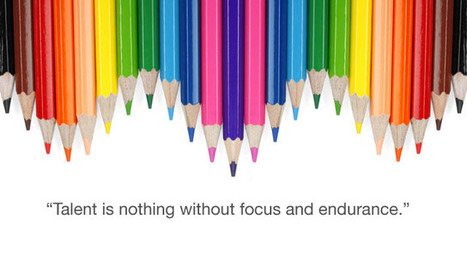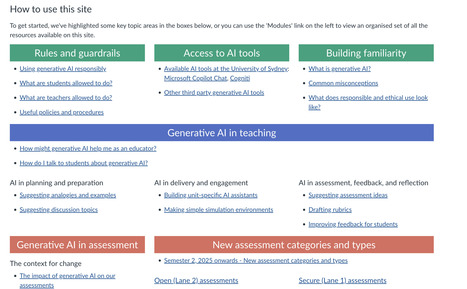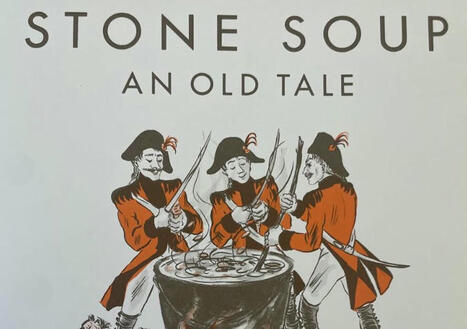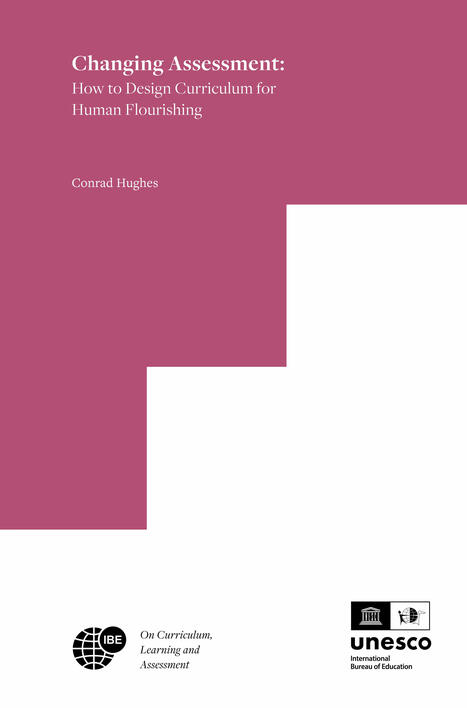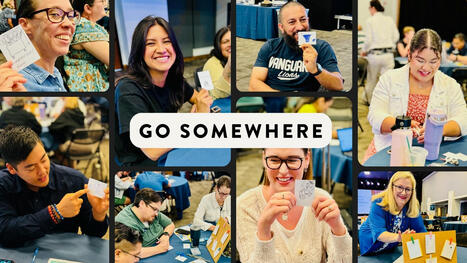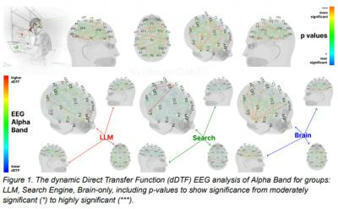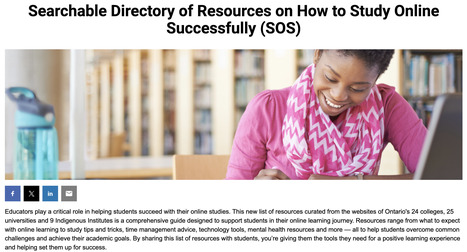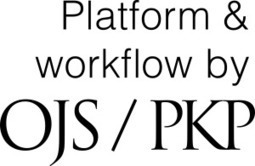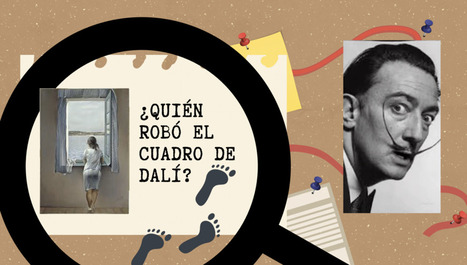 Your new post is loading...
 Your new post is loading...

|
Scooped by
Ana Cristina Pratas
October 2, 2011 2:24 PM
|

|
Scooped by
Ana Cristina Pratas
July 9, 11:12 AM
|
Learn 5 practical steps to update college assignments for the AI age—boosting critical thinking, authentic learning, and academic integrity.

|
Scooped by
Ana Cristina Pratas
June 30, 8:13 AM
|
Explore how letting go of ego and embracing mindful presence can transform teaching. Discover how "teaching without a self" fosters connection, resilience, and deeper learning.

|
Scooped by
Ana Cristina Pratas
June 24, 9:42 AM
|
The post reflects on metaphors used to discuss artificial intelligence, particularly introducing an origami analogy. It emphasises that AI outputs are intricately shaped by the training data like origami models are formed from a single sheet of paper. This analogy reveals insights into AI's limitations, creativity, and the nature of its outputs.

|
Scooped by
Ana Cristina Pratas
June 24, 9:38 AM
|
"This site is a resource designed for educators by educators, created to support the productive and responsible use of generative artificial intelligence in teaching and learning at the University of Sydney and beyond. This site complements our 'AI in EducationLinks to an external site.' site which is designed for students by students, and contains resources and advice."

|
Scooped by
Ana Cristina Pratas
June 24, 9:29 AM
|
An old tale with modern relevance

|
Scooped by
Ana Cristina Pratas
June 22, 12:47 PM
|
Commentary on Stephen's Web ~ On Ethical AI Principles by Stephen Downes. Online learning, e-learning, new media, connectivism, MOOCs, personal learning environments, new literacy, and more

|
Scooped by
Ana Cristina Pratas
June 18, 3:30 AM
|
"Each Snapshot of Teaching is defined by three characteristics: it builds on and challenges traditional methods
it integrates new AI-based tools or approaches
it is all about improving results for both students and educators"

|
Scooped by
Ana Cristina Pratas
June 3, 2:23 PM
|
This post initiates a nine-article series revisiting the "Teaching AI Ethics" resources from 2023 exploring bias in GenAI.

|
Scooped by
Ana Cristina Pratas
May 23, 3:11 AM
|
Two studies show that many college students are offloading higher order thinking to AI, asking chatbots to do hard work for them.

|
Scooped by
Ana Cristina Pratas
May 22, 4:40 AM
|
A flood of AI-generated content It’s a fact that AI is capable of producing convincing and often useful text and other content. Yes, there are concerns about the quality, accuracy and even the environmental impact of that content, but there’s no doubt AI can produce it and that it is already widespread. It is legitimate to ask now whether any piece of content was authored

|
Scooped by
Ana Cristina Pratas
May 11, 6:28 AM
|
"The AI Assessment Scale (AIAS) was developed by Mike Perkins, Leon Furze, Jasper Roe, and Jason MacVaugh. First introduced in 2023 and updated in Version 2 (2024), the Scale provides a nuanced framework for integrating AI into educational assessments."

|
Scooped by
Ana Cristina Pratas
May 5, 8:34 AM
|
Discover adaptable active learning strategies to boost student engagement in both traditional classrooms and asynchronous online courses.
|

|
Scooped by
Ana Cristina Pratas
July 14, 8:32 AM
|
Discover how integrating artificial intelligence and critical thinking strategies can foster transformative learning experiences in higher education. Learn how educators can model, guide, and support students in navigating AI with intention, reflection, and integrity.

|
Scooped by
Ana Cristina Pratas
July 6, 10:03 AM
|
"Changing Assessment" published on 24 Mar 2025 by Brill. "Since the Delors report, education reformers have been working to create curricula that allow human beings to flourish. Schools should not only be places where we learn to be and learn to live together, but also places where the way we assess students valorises the diverse range of human gifts within them. Yet, most schools remain locked in a 19th-century assessment structure that prevents young people from exploring the full variety and extent of their talents, forcing them to perform on a narrow, high-stakes track. When will this change? In this remarkable book, Conrad Hughes gives an overview of the assessment problem affecting schools and creates a path to take to broaden assessment and potentially reposition the whole purpose of schooling. It is a brave, beautifully written treatise that anyone interested in education and assessment should read."

|
Scooped by
Ana Cristina Pratas
June 27, 8:12 AM
|
Learn how AI prompting can foster critical thinking in students. Discover strategies for teaching prompt engineering, evaluating AI-generated content, and integrating AI ethically into coursework.

|
Scooped by
Ana Cristina Pratas
June 24, 9:39 AM
|
(image is a Bryan Mathers sketch of my keynote) As I mentioned in my last post, I gave a keynote at the Education After the Algorithm conference in Dublin last week. It was a thoughtful, engaging event, congrats to Eamon Costello and all involved.

|
Scooped by
Ana Cristina Pratas
June 24, 9:30 AM
|
Get started with Beautiful.ai today.

|
Scooped by
Ana Cristina Pratas
June 23, 12:02 PM
|
Discover how integrating systems thinking and learner-centered teaching enhances liberal arts education through interdisciplinary and holistic learning strategies.

|
Scooped by
Ana Cristina Pratas
June 22, 12:46 PM
|
Commentary on Stephen's Web ~ Your Brain on ChatGPT: Accumulation of Cognitive Debt when Using an AI Assistant for Essay Writing Task by Stephen Downes. Online learning, e-learning, new media, connectivism, MOOCs, personal learning environments, new literacy, and more

|
Scooped by
Ana Cristina Pratas
June 16, 3:29 PM
|
Discover how starting class with paradoxes—not content—ignites curiosity, deepens learning, and transforms classroom engagement.

|
Scooped by
Ana Cristina Pratas
June 3, 2:19 PM
|
As part of my PhD studies, I read and write a lot of stuff that doesn’t really fit into my research, but which I find interesting anyway. I’m categorising these “spare parts” on my blog, and if you’re interested in following them you’ll find them all here. I’ve written a fair bit about AI ethics, […]

|
Scooped by
Ana Cristina Pratas
May 22, 4:44 AM
|
Educators play a critical role in helping students succeed with their online studies. This new list of resources curated from the websites of Ontario's 24 colleges, 25 universities and 9 Indigenous Institutes is a comprehensive guide designed to support students in their online learning journey.

|
Scooped by
Ana Cristina Pratas
May 12, 11:17 AM
|
Given this reality in which AI can provide and synthesize information for and to our students at their requests in seconds, it is not completely paranoid to ask the question, “What can we, as college instructors, offer our students in the age of AI?”

|
Scooped by
Ana Cristina Pratas
May 6, 8:22 AM
|
Abstract
Recent developments in Generative Artificial Intelligence (GenAI) have created a paradigm shift in multiple areas of society, and the use of these technologies is likely to become a defining feature of education in coming decades. GenAI offers transformative pedagogical opportunities, while simultaneously posing ethical and academic challenges. Against this backdrop, we outline a practical, simple, and sufficiently comprehensive tool to allow for the integration of GenAI tools into educational assessment: the AI Assessment Scale (AIAS). The AIAS empowers educators to select the appropriate level of GenAI usage in assessments based on the learning outcomes they seek to address. The AIAS offers greater clarity and transparency for students and educators, provides a fair and equitable policy tool for institutions to work with, and offers a nuanced approach which embraces the opportunities of GenAI while recognising that there are instances where such tools may not be pedagogically appropriate or necessary. By adopting a practical, flexible approach that can be implemented quickly, the AIAS can form a much-needed starting point to address the current uncertainty and anxiety regarding GenAI in education. As a secondary objective, we engage with the current literature and advocate for a refocused discourse on GenAI tools in education, one which foregrounds how technologies can help support and enhance teaching and learning, which contrasts with the current focus on GenAI as a facilitator of academic misconduct.

|
Scooped by
Ana Cristina Pratas
May 1, 2:23 PM
|
By Roberta Montella and Dan Nickolai, Saint Louis University DOI: https://www.doi.org/10.69732/RVZW4726 One of the most time-consuming tasks of lesson planning is the preparation of pedagogical resources for our language courses. This is especially true when it comes to modifying or
|






 Your new post is loading...
Your new post is loading...
